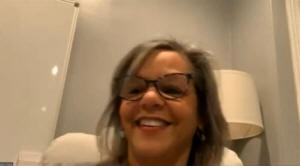U.S. Rep. Kelly wins tight race for Democratic Party chair
 Send a link to a friend
Send a link to a friend
[March 05, 2021]
By JERRY NOWICKI
Capitol News Illinois
jnowicki@capitolnewsillinois.com
 SPRINGFIELD – Illinois' Democratic State
Central Committee elected U.S. Rep. Robin Kelly as its new chair
Wednesday night on a razor thin margin. SPRINGFIELD – Illinois' Democratic State
Central Committee elected U.S. Rep. Robin Kelly as its new chair
Wednesday night on a razor thin margin.
Kelly, who lives in suburban Matteson and represents the 2nd
Congressional District, edged out Chicago Ald. Michelle Harris with just
over 50 percent of the weighted vote of the 36 members of the Central
Committee – there are two for each congressional district. The 2nd
District spans from the south side of Chicago and its suburbs to south
of Kankakee.
Kelly was backed by U.S. Sen. Dick Durbin, while Gov. JB Pritzker and
U.S. Sen. Tammy Duckworth backed Harris. The congresswoman edged out the
alderwoman by about 3 percent of the weighted vote.
Kelly is now the first black woman to be elected chair of the party and
the first person who is not Michael Madigan to hold the post since 1998,
aside from vice chair Karen Yarbrough, who replaced Madigan on an
interim basis after his resignation last month.

Yarbrough presided over the virtual forum Wednesday night in which Kelly
received several questions about her ability to fundraise for the party
as a sitting member of Congress.
A pair of legal opinions that circulated in the run-up to the Madigan
replacement vote stated that Kelly would not be able to raise or
distribute “soft money,” which refers to money spent on state and local
elections, although she would have no restrictions on fundraising for
federal races.
Under Madigan, the Democratic Party of Illinois was one of the main
fundraisers for candidates running for the state House.
Several Democratic committeepersons, including former Senate President
John Cullerton, cited the concerns about fundraising as a reason he
could not back Kelly.
“One of the biggest things that state chairman does is raise money.
Whether we like it or not that's one of the things we have to do,” he
said. “We have a serious problem – the Republicans are gonna have a
field day… We are going to be investigated by the Federal Elections
Commission. The donors who normally would be happy to donate to the
Democratic Party are going to be hesitant.”
But Committeewoman and state Sen. Cristina Castro, D-Elgin, said Kelly
has a vision for what DPI fundraising can become – a mechanism for party
building instead of mainly supporting House Democrats.
“It shouldn't be focused on one chamber or the other. It should be a
whole state fundraising operation that I would be proud to help with,”
she said.
Many pointed to a decentralization of fundraising from what had become a
Madigan-focused effort during his two-plus decades controlling the
party. Several, including Castro, said a decentralized approach could be
better for the party’s brand across the state as political maps trend
more red in downstate and rural areas.
[to top of second column]
|

U.S. Rep. Robin Kelly speaks during a virtual forum
Wednesday evening after she was elected chair of the Democratic
Party of Illinois by member's of the party's state central
committee. (Credit: Blueroomstream.com)

Kelly said she does not believe fundraising will be an obstacle.
“We need to support and invest in the infrastructure that enables
local parties to be effective in their effort to recruit and elect
Democrats,” she said in her pitch to the committeepersons. “I have a
proven track record that goes beyond campaigning and supporting
Democrats up and down to ticket. I've raised millions of dollars to
support those efforts, not just in Illinois, but across the
country.”
She cited her role as congresswoman in an urban, suburban and rural
district.
“As chair, I will bring together a statewide coalition that not only
includes long-term party stakeholders, but also engages the
grassroots,” she said. “It’s time party leadership reflects the
diversity of the state across all demographics and regions.”
And she said she is dedicated to “building a bench” of Democratic
candidates, saying Democracy is “under siege,” citing her experience
of being in the U.S. House chamber when rioters stormed the Capitol
on Jan. 6.
“If we are going to preserve, protect and defend the government of
the people, by the people and for the people, we must change, we
must fight back, we must take on the big lie, the insurrectionists,
the Fox News, the QAnons, head on,” she said after being elected
chair. “And with your help, the same Illinois party that elected the
first African American woman to the United States Senate, sent the
first African American president to the White House, and had so many
other firsts, will lead the way.”
Republicans, meanwhile, used the loss of the Pritzker-backed
candidate for its post-election messaging, sending a news release
saying the party “expresses sympathy” to the governor.

“The Illinois Republican Party would like to provide our sympathies
to Governor Pritzker as he is in the midst of a long string of
high-profile political losses. It really is sad,” the state GOP said
in a news release.
They cited as “losses” the defeat of the graduated income tax,
Pritzker’s reported backing of Sen. Kimberly Lightford for Senate
president last year – a post that went to Sen. Don Harmon – and the
lame duck session defeat of a bill decoupling the state and federal
tax code regarding business losses.
Both Harris and Kelly said there would be no hard feelings
regardless of result of the vote, and they pledged to work together
to support Democratic candidates.
Capitol News Illinois is a nonprofit, nonpartisan
news service covering state government and distributed to more than
400 newspapers statewide. It is funded primarily by the Illinois
Press Foundation and the Robert R. McCormick Foundation. |